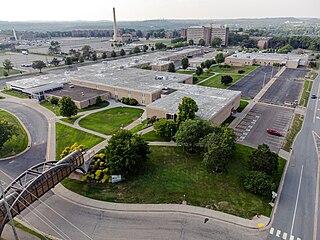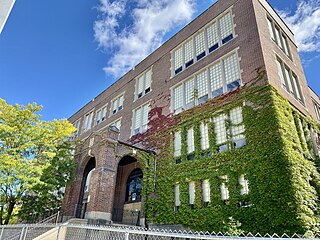
Waukesha County is a county in the U.S. state of Wisconsin. As of the 2020 United States Census, the population was 406,978, making it the third-most populous county in Wisconsin. Its median income of $88,985 placed it as the only county in Wisconsin on the list of the 100 highest-income counties in the U.S. by median income as of 2020. Its county seat and largest city is Waukesha.

The Universities of Wisconsin is a university system of public universities in the U.S. state of Wisconsin. It is one of the largest public higher-education systems in the country, enrolling more than 160,000 students each year and employing approximately 41,000 faculty and staff statewide. The system is headquartered in the state capital of Madison.

Wisconsin has a long history with the Boy Scout and Girl Scout organizations from the 1910s to the present day, both programs have independently served thousands of youth in programs that suit the environment in which they live.
Madison Area Technical College or simply Madison College or MATC is a public technical college based in Madison, Wisconsin. It serves students in parts of 12 counties in south-central Wisconsin: Adams, Columbia, Dane, Dodge, Green, Iowa, Jefferson, Juneau, Marquette, Richland, Rock, and Sauk.
The University of Wisconsin Colleges was a unit of the University of Wisconsin System composed of 13 local two-year campuses and one online campus. These campuses offered a liberal arts, transfer-parallel curriculum. The unit was established in 1971 and was dissolved on June 30, 2018.
The Illinois Community College System consists of 39 public community college districts, composed of 48 community colleges and one multi-college center where 3 of the community colleges offer additional classes. Thirty-seven of the districts have a single college; two districts are multicollege. Since July 1990, the entire state has been included within community college district boundaries.

Chippewa Valley Technical College is one of the 16 technical and community colleges in the Wisconsin Technical College System, centered in Eau Claire, Wisconsin. It serves an 11-county area, with its largest campus in Eau Claire and major regional centers in Chippewa Falls, Menomonie, Neillsville and River Falls.

Lakeland University is a private university with its main campus in Herman, Wisconsin. Lakeland University is affiliated with the United Church of Christ. Lakeland also has seven evening, weekend, and online centers located throughout the state of Wisconsin—in Pewaukee, Madison, Wisconsin Rapids, Chippewa Falls, Neenah, Green Bay, and Sheboygan—and a four-year international campus in Tokyo.

Lakeshore College is a public community college in Cleveland, Wisconsin. It is part of the Wisconsin Technical College System. The college offers associate degree and technical diploma programs as well as certifications and adult continuing education programs.
The administrative divisions of Wisconsin include counties, cities, villages and towns. In Wisconsin, all of these are units of general-purpose local government. There are also a number of special-purpose districts formed to handle regional concerns, such as school districts.

Milwaukee Area Technical College is a public two-year vocational-technical and community college based in Milwaukee, Wisconsin. MATC offers day, evening, weekend and online classes at campuses in downtown Milwaukee, Oak Creek, West Allis, and Mequon as well as an education center in the Walker's Square neighborhood on Milwaukee's near south side. More than 30,000 students are enrolled each year, with most students (56%) identifying as students of color. MATC offers over more than 180 accredited associate degrees, technical diploma and certificates. MATC also offers short-term badges, GED and HSED classes, high school diplomas through its Adult High School program, and English as a Second Language programs.

Northcentral Technical College (NTC) is a public community college in Wausau, Wisconsin. It is a member of the Wisconsin Technical College System. The district of the college includes all of, or portions of, Marathon, Lincoln, Taylor, Price, Langlade, Menominee, Clark, Portage, Shawano and Waupaca counties. The main campus is located in Wausau. There are regional centers in Antigo, Medford, Merrill, Phillips, Spencer and Wittenberg.

The Wisconsin School for the Blind and Visually Impaired (WSBVI) is a state school that specializes in teaching the visually impaired. It is operated by the Wisconsin Center for the Blind and Visually Impaired (WCBVI), a unit of the Wisconsin Department of Public Instruction. Founded in 1849, the school is located in Janesville, Wisconsin.

Southeastern Technical College (STC) is a public community college in Vidalia, Georgia with a satellite campus in Swainsboro and distance learning centers among its eight-county service area. It is part of the Technical College System of Georgia and provides vocational and adult education to students in Candler, Emanuel, Jenkins, Johnson, Montgomery, Tattnall, Toombs, and Treutlen counties.

The Eau Claire Area School District (ECASD) is a school district in western Wisconsin and the eighth-largest district in the state.

The Madison Vocation School is a Collegiate Gothic-style structure begun in 1921 one block north of the Capitol building in Madison, Wisconsin. In 2019 it was added to the National Register of Historic Places.












